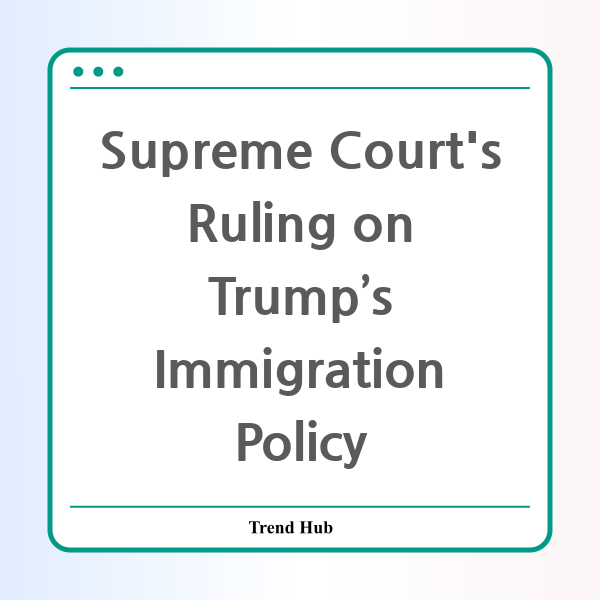* This website participates in the Amazon Affiliate Program and earns from qualifying purchases.

In a significant legal development, the US Supreme Court has recently ruled that the Trump administration must facilitate the return of a migrant who was wrongfully deported to El Salvador. This ruling not only highlights the complexities surrounding immigration policies but also shines a light on the ongoing debates regarding the administration's approach to undocumented individuals.
The case revolves around 29-year-old Kilmar Abrego Garcia, a Salvadoran migrant who had been living in Maryland under protected legal status since 2019. His protected status was based on the presiding judge's assessment that returning him to El Salvador would expose him to potential harm, particularly from violent gangs. However, in a troubling turn, Garcia was deported under the Trump administration's aggressive immigration tactics, which saw over 200 individuals sent to a notorious prison in El Salvador known for housing gang members.
Garcia's deportation was deemed an "administrative error," a statement that raises critical concerns about the procedural integrity behind such significant actions. The Supreme Court's unanimous decision, delivered in a 9-0 ruling, ordered the government not only to return Garcia but to ensure that his case is handled properly, just as it would have been had he not been wrongfully sent to El Salvador.
Simon Sandoval-Moshenberg, Garcia's lawyer, celebrated the decision as a victory for the rule of law, indicating that the Supreme Court's action underscores the importance of due process in immigration cases—a critical issue in the wake of the Trump administration's often controversial policies.
The backdrop to this case involves the Trump administration's categorization of certain groups as foreign terrorist organizations, linking migrants like Garcia with gangs such as MS-13 and Tren de Aragua. While the government claimed that Garcia was associated with MS-13, lower courts found insufficient evidence to support this claim, highlighting the precarious nature of accusations against undocumented migrants.
In a further twist, the Supreme Court's directive also called for the lower court to clarify its initial order regarding the return of Garcia, emphasizing the need for deference to the executive branch in matters of foreign affairs. This reflects a delicate balance between judicial oversight and executive authority—a theme that has played a crucial role in various legal disputes arising from Trump's immigration policies.
Undoubtedly, this ruling is a pivotal moment not only for Garcia and his family but also for the broader context of US immigration policy. Advocates for immigrants’ rights have expressed concern over the treatment of deportees, many of whom face dire conditions upon their return to countries fraught with violence and instability.
As the Supreme Court lays the groundwork for how future cases might be handled, it also opens up discussions about the overarching strategies employed by the government in enforcing immigration law. The collaboration between the US and foreign governments in dealing with migrants raises questions about humane treatment and international responsibility.
Garcia's case will now return to trial court, marking another chapter in this ongoing saga of immigration and legal rights in America. This situation exemplifies the pressing need for an immigration system that not only upholds national security but also safeguards the dignity and rights of individuals caught in the crossfire of policy decisions.
* This website participates in the Amazon Affiliate Program and earns from qualifying purchases.